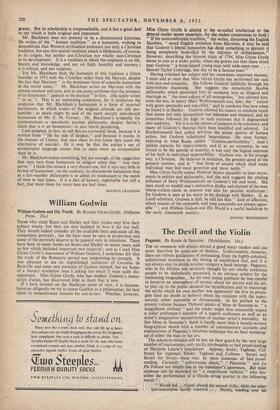William Godwin
THOSE who study Keats and Shelley and their circles may love their subject wisely, but they are also inclined to love it far too well. They should indeed consider all the available facts and paint all .the companion portraits ; but the facts must be seen in proportion and some of the portraits deserve to be painted only in miniature. There have been so many books on Keats and Shelley in recent years, and so few which included important new material ; and as I read Miss Glynn Grylls's assessment of William Godwin, I sometimes felt that the study of the Romantic period was outgrowing its strength. It was pleasant to see an unpublished miniature of Cornelia de Boinville and some rare portraits of Godwin himself, but my hopes of a literary revelation (was I asking too much ?) were sadly dis- appointed. Miss Glynn Grylls, who has studied Godwin's manu- script diaries, has discovered little in them that is new.
If I have insisted on the Shelleyan point of view, it is, because, however diligently we try to assess Godwin as a philosopher, his best claim to remembrance remains his son-in-law. Whether, however,
Miss Glynn Grylls is aiming at the so-called intellectual or the general reader seems uncertain, for she makes concessions to both : " If the noncomformist tradition," she writes, discussing the English Jacobins, " saved English socialism from Marxism, it may be said that Godwin's liberal humanism has done something to prevent it being completely bedevilled by the calculus of utilitarianism." However, describing the treason trials of 1794, Miss Glynn Grylls seems to aim at a wider public, when she points out that there stood near Godwin " a loose-lipped young man with wide-open eyes . . . Samuel Taylor Coleridge, one day to be a famous poet."
Having criticised her subject and her sometimes uncertain manner, I must add at once that Miss Glynn Grylls has performed her task with care and sympathy. She follows Godwint faithfully through his labyrinthine reasoning. She suggests the remarkably flexible philosophy which permitted him to condemn love as illogical and marriage as " the most odious of all monopolies," but allowed him, none the less, to marry Mary Wollstonecraft and, later, the " widow with green spectacles and one child," and to condemn free love when he found it in Shelley. Godwin allowed his reason to condone much that seems not only inconsistent. but inhuman and immoral, and he :sometimes followed his logic to. such extremes that it degenerated into sophistry. Yet it is in the nature of pioneers to be extremist, and many of Godwin's theories have been modified and admired. La Rochefoucauld had called self-love -the prime motive of human action, but Godwin substituted benevolence. He went further, believing in what Keats called "Godwin-perfectibility", man's infinite capacity for improvement, and if, as art extremist, he was forced to be the apostle of anarchy, it was only the logical outcome of his faith in individual responsibility. Godwin was, in his strange way, a Christian. He believed in socialism, the greatest good of the greatest number, and in " that form of society which shall make individual man feel most generous and most noble."
Miss Glynn Grylls relates Political Justice plausibly to later move- ments in politics and philosophy, and she well suggests the abiding influence of Mary Wollstonecraft on Godwin's life and work. She does much to modify one's instinctive dislike and distrust of the man whose evident claim to renown was also his peculiar misfortune for Godwin is seen at his worst in his dealings with Shelley. If, as Lamb admitted, Godwin is dull, he still has that " dash of affection, which smacks of the coxcomb, and your coxcombs are always agree- able " ; and William Godwin and His World is a useful backdrop to the early nineteenth century.
JOANNA RICHARDSON


































 Previous page
Previous page